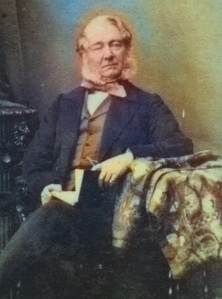The huge financial cost of Victorian elections, especially in venal constituencies, has been a recurrent theme in some of our more recent blogs. It’s tempting to think of the MPs associated with bribery, treating and other forms of electoral corruption as guilty parties in this system, but William Wilshere’s career provides a useful insight into how little control the candidate sometimes had over the management of an election. Wilshere not only had to endure a process of being ‘traded’ by central election managers, in secret deals about disputed elections, but also found himself elected without his knowledge. Charged as a result with breaking an agreement, he narrowly escaped having to fight a duel.
These days MPs tend to seek constituencies, but in the 19th century it was often the other way round. Venal boroughs, in particular, actively canvassed for suitably wealthy candidates, who could then be milked for as much as possible, especially at election time. Boroughs in which freemen still had the parliamentary franchise tended to be the most demanding and Great Yarmouth was one of the most notorious. In 1837 Wilshere was invited to stand there in a coalition with a former Whig MP, who was running low on funds. Wilshere’s vast wealth – he had inherited the bulk of his uncle’s £140,000 fortune in 1824 along with a large Hertfordshire estate – made him a prime catch and he quickly ‘won the hearts’ of the freemen with what the local paper termed his ‘affability’. He was elected as a Liberal in second place, after what was termed a particularly ‘keen’ contest. However, his defeated Tory opponent Thomas Baring promptly charged Wilshere’s supporters with bribery and challenged the result on petition.
What occurred next was deemed ‘remarkable in the history of elections’. The committee randomly selected to investigate the petition was dominated by Tory MPs. Rather than risk the whole election being invalidated, Wilshere was urged by the Liberal party’s central election managers to retire as part of a compromise deal, and allow Baring to come in unopposed in a by-election. This would avoid risking his Whig colleague’s seat. He initially refused to co-operate, believing the Tories were equally culpable of bribery. Realising this would not be investigated under the terms of the petition, however, he agreed to step down, but only at the end of the 1837-8 session. He also promised not to interfere in the ensuing by-election.
Wilshere duly took the Chiltern Hundreds in August 1838 and promptly left for the Continent. Meeting a friend ‘accidentally’ in the streets of Paris a few weeks later, however, he discovered that a group of dissident freemen in Great Yarmouth had refused to accept the compromise deal agreed in London and, ‘without his sanction, approbation or permission’, had successfully nominated and elected him in his absence. He was now an MP again. Baring, meanwhile, was seething. Rumours quickly spread that he would ‘make his appeal to pistols’ if Wilshere refused to vacate the seat.
Wild press speculation about a duel was cut short by the appointment of two arbitrators, the Whig Marquis of Tavistock and the Conservative Charles Greville. They jointly ruled that Wilshere was ‘bound to resign’, even though he had clearly ‘not been party’ to his controversial re-election. Feeling vindicated, but fearing further trouble and expense at another by-election, Baring decided not to insist that Wilshere formally step down, contenting himself with more public remarks about his ‘ungentlemanly conduct’.
Resuming his seat, for which he was re-elected again in 1841, Wilshere went on to become a diligent MP, rarely speaking but giving staunch support to the Liberals in the division lobbies and presenting a steady stream of constituency petitions on local matters.
In 1847, however, he took everyone by surprise by announcing his retirement, aged just 42. He initially cited ‘family engagements’ and other ‘private motives’. Repeatedly ‘pressed’ to change his mind by Great Yarmouth’s freemen, he continued to decline politely but eventually let his real reasons be known. Protesting that he had already spent over £10,000 ‘among them’, which included bills charged for the 1838 by-election held without his consent, he declared that he could no longer afford the seat, fearing that a ‘very considerable sum’ would be required from him again. He found it ‘prudent to close his purses before they are entirely emptied’, quipped one local paper.
Wilshere is not known to have sought re-election again but he did remain an active supporter of his local Liberal party in Hertfordshire. A benefactor of ‘every worthy cause or institution’, it was later said that he ‘had a large heart and gave like a prince’. Paralysed for the last two years of his life, he died at the Hotel Windsor, Rue de Rivoli, Paris, in November 1867, leaving an estate valued at £35,000.
Further reading:
P. Salmon, Electoral Reform at Work (2002), pp. 101-16.


Pingback: Happy New Year from the Victorian Commons! | The Victorian Commons